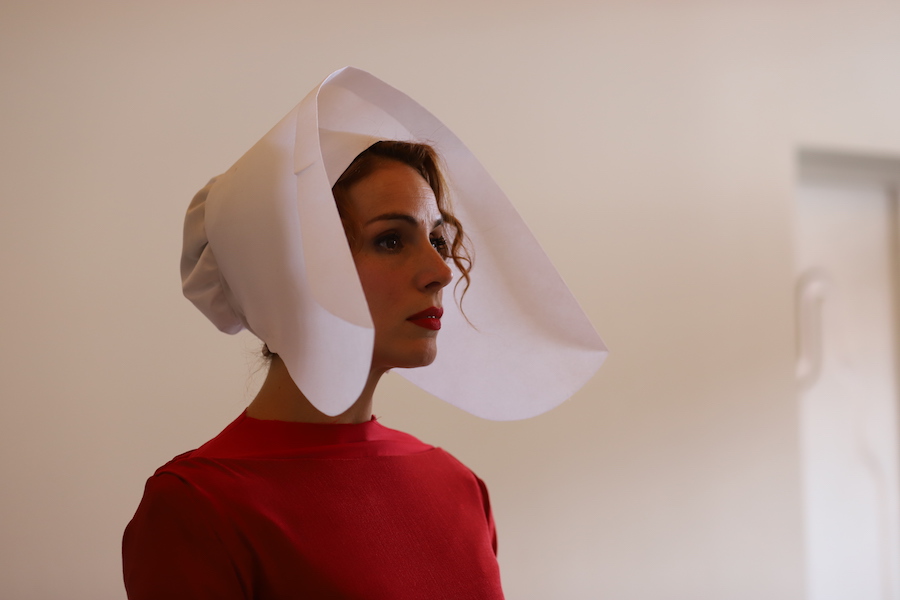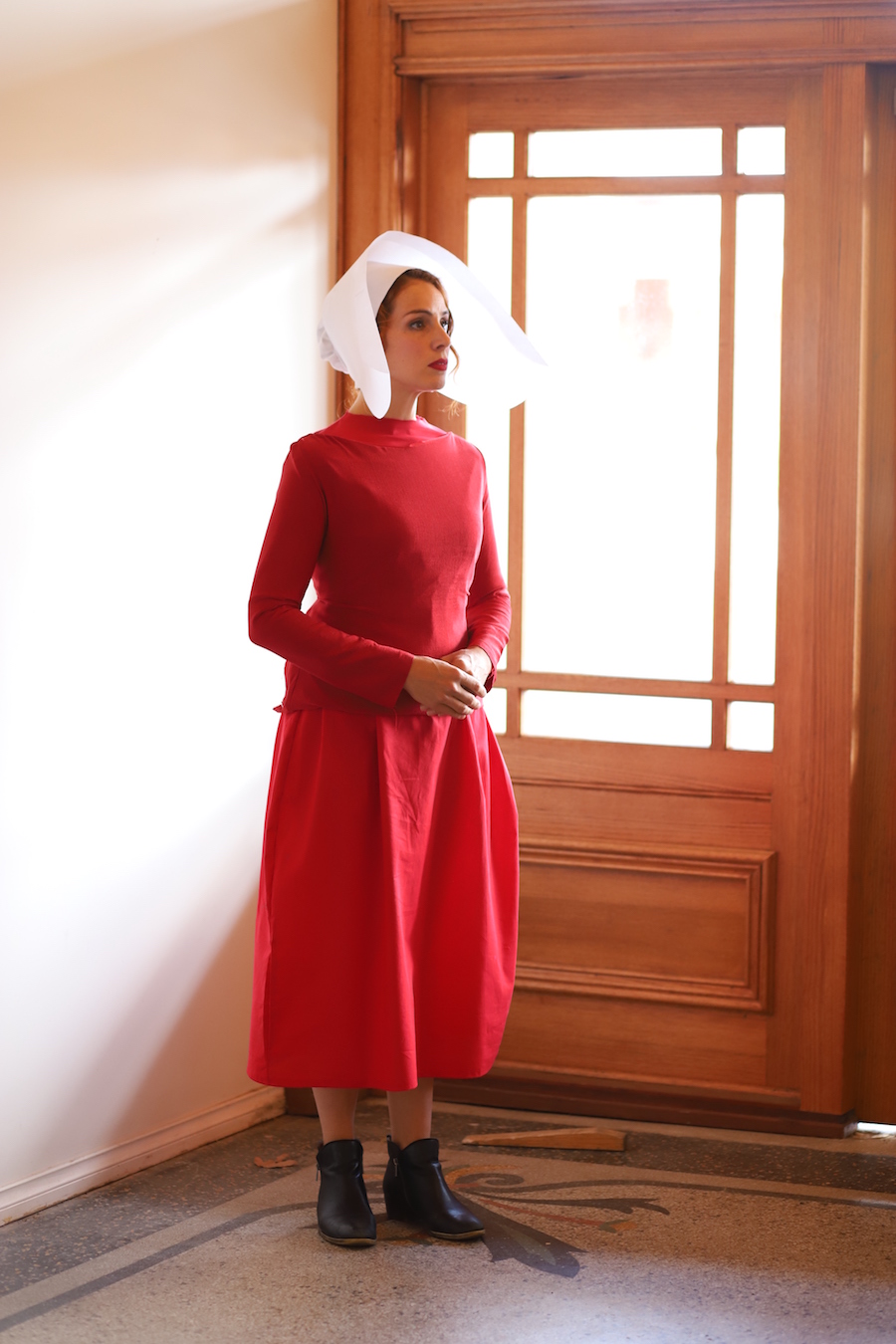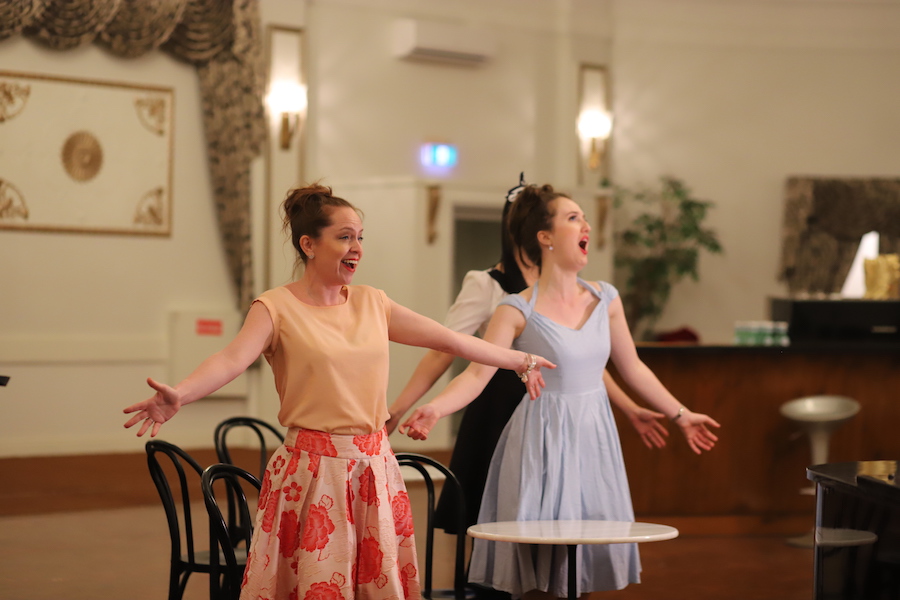Yarra Valley Opera Festival, Melbourne
October 13, 2018
The idea to stage an opera festival has long been mulled over by Artistic Director of Melbourne’s lesser-known Gertrude Opera, Linda Thompson. It’s a daring undertaking but Thompson took up the challenge in mounting Australia’s first comprehensive festival in 2015 with the inaugural Nagambie Lakes Opera Festival in central Victoria. Then came a second in 2016 but it didn’t survive another season. Now, with experience and newfound support, a festival has arrived that has potential to grow in reputation to become a part of the Australian opera lover’s wish list and, what Thompson and everyone involved dreams of, stretch with international recognition.
 Sarah Heltzel as Offred in The Handmaid’s Tale. Photo © Rebecca Keith
Sarah Heltzel as Offred in The Handmaid’s Tale. Photo © Rebecca Keith
Just an hour’s drive from Melbourne, the scenic countryside of the Yarra Valley is an idyllic place already carrying prestige for its wine and gourmet food industries. The inaugural Yarra Valley Opera Festival aims to become an integral part of its allure. It has a long way to go but judging by its opening weekend on Friday evening with a gala concert featuring rising star of Opera Australia, dynamic soprano Stacey Alleaume, the excitement around its establishment and the support given by the local community was palpable.
Thompson’s program includes 4 main productions – the popular repertoire pieces of Mozart’s Così fan tutte and Donizetti’s The Elixir of Love, a clever adaptation of Mozart’s one-act opera Der Schauspieldirektor entitled A Tale of Two Divas and the much-anticipated Australian premiere of Poul Ruders’ The Handmaid’s Tale.
Set within the historic Olinda Yarra Estate under a large, white, circus-like tent, Saturday’s opening night of The Handmaid’s Tale gave every indication the hard yards had paid off. Around 200 patrons could not have left disappointed, only perhaps catapulted from the quietude and beauty of the setting into a daunting realm of fearsome and chilling proportions.
The Handmaid’s Tale is the festival’s centrepiece. Many would be familiar with the current television series based on Margaret Atwood’s award-winning novel published in 1985. Fewer would be aware that it was reimagined as an opera by Danish composer Poul Ruders to an English libretto by Paul Bentley, premiering in 2000 at the Royal Danish Opera.
In a regressive, totalitarian society known as Gilead, women are prohibited from owning property, reading or choosing what they wear. Suffering declining birth rates due to an environmental catastrophe, fertile women and those who sin contravene strict commandments are inculcated as Handmaids by Aunts and placed into homes to have intercourse with and bear children for high-ranking Commanders whose wives are infertile. Handmaids are demeaningly forced to take their Commanders’ names, with the prefix “of” denoting their subjection. From every angle, the degradation of women is entrenched – hardly a far-flung notion in our modern world.
The focus is on the Handmaid Offred’s story and told in flashbacks. It begins with footage declaring a state of emergency. In a short prologue, at a conference in the year 2195 on the mono-theocracies of Iran and Gilead, a lecture is given by a certain Professor Pieixoto (Michael Veitch) in which a recently uncovered audio-cassette diary recorded by Offred is played to the delegates.
 Sarah Heltzel as Offred in The Handmaid’s Tale. Photo © Rebecca Keith
Sarah Heltzel as Offred in The Handmaid’s Tale. Photo © Rebecca Keith
Over its subsequent two acts, a series of scenes reveal Offred’s tormented existence. She clings ever so fragilely to her identity and womanhood, partially desensitised to the servitude she lives under and psychologically battered by her separation from her husband Luke and the whereabouts of her child.
Anyone familiar with the novel or television series would follow it without too much difficulty but, simply to get the most out of the plot, English surtitles would have greatly benefited. Nonetheless, Thompson’s direction digs deep and its music utterly holds one’s attention. Ruders’ score is a spectacular conglomeration of sonic form. From the daintiest short ramblings of a few violins to the jolting explosive bursts of percussive richness and full orchestral force, it never languishes in its portrayal of a world both alien and haunting. More often declamatory in style, vocal lines rarely shape into lengths of aria, apart from the chorus of Handmaids who sing with greater melody. The combined effect is spellbinding.
Gertrude Opera is adept in transforming opera into sums greater than its parts on a shoestring budget but never has it mobilised 45 musicians – and expert playing at that – to drive its larger ambitions. Conductor Patrick Burns did a remarkable job in exposing its passages of introspective energy, turbulence and the terrifying world within. It was also a fabulous sight and sound with the orchestra arranged around three sides of the raised square stage.
The action unfolds in mostly cold and distant, pseudo-mechanical movements. Offred appears the exception, a character that American mezzo-soprano Sarah Heltzel depicted with achingly dark tones, strength and resilience. Unsurprisingly, Offred not only carries the bulk of the vocal output but almost always on stage and Heltzel never let down her guard in giving the best of both. Heltzel interpreted Offred’s lines like they were hers and one especially stands out. At a doctor’s visit for a gynaecological examination, she sings “It used to be my instrument to do my will” and in that she summed up hers and many women’s complete loss and violation.
Every time mezzo-soprano Emily Burke stepped out as the iron-fisted Aunt Lydia who presides over the Handmaids, you needed to brace yourself for the ground-shaking force and leaps of vocal pyrotechnics she let loose. Burke’s performance was exceptional, firing up her Aunts (Karen Van Spall and Wendy Grose in firm voice), drilling obedience into her Handmaids and extolling lines such as “This is not a prison but a privilege”. The collective spirit of female voices was highly affecting. On many levels, Poulenc’s terrifying, French Revolution-era Dialogues des Carmélites came to mind, in which nuns who refused to renounce their vocation were sent to the guillotine.
Rose Nolan is another standout as the stiffly postured, cigarette-smoking wife of Offred’s Commander, Serena Joy. Impactful, cutting and controlled in voice, Nolan imbued Serena Joy with icy demeanour in perfectly acting out her part under a male-dominated regime, one in which a man’s fertility isn’t in question. Serena Joy’s existence is a paradox and as she holds Offred by the arms as her husband copulates with his Handmaiden, her own compromised womanhood becomes transparent.
In his first major role and in possession of a rich and molten baritone, Matthew Lowe gave the Commander an air of slyness and distinction. Lowe needed a little more volume at times but his vital and sometimes confronting scenes with Offred in private and public were coolly assertive.
Across the board, the extensive supporting cast delivered assured performances, led by a lush-voiced Georgia Wilkinson as Janine and the expressive Maria Hemphill as Moira. Appealingly smooth and lyrical, tenor Nigel Huckle was convincing as Nick, the young man secretly drawn into the situation by Serena Joy to copulate with Offred after she fails to fall pregnant. Raymond Khong’s dexterous falsetto gave the Doctor imposing presence and Hew Wagner’s sympathetic Luke and other Handmaids Kate Bright, Louise Keast, Naomi Flatman, Yu Lin, and Chloe Wood are similarly to be commended.
The many scenes of the plot came together powerfully via Thompson’s direction and her design team. Joseph Noonan’s ingenious and simple set was little more than a background wall of vertical canvas flaps that allowed entrances and exits to be made swiftly and artistically. Open-framed supports for lighting demarcated the stage area. Limited minimalist furnishings were rolled in and out, allowing one scene to often bleed effectively from one side of the stage to the other. Spare use of video footage projected on the background flaps by Greta Nash added some details to the story and lumination was subdued as part of Jason Crick’s excellently conceived lighting. Noonan’s costumes, based directly on the book, naturally featured the long red dresses and white-coned bonnets that denote the Handmaid’s place in society with the Aunts dressed in liturgical-like robes.
If Thompson’s aim was to entrance and jolt her audience, as well as drive home a regime’s despicable agenda and treatment of women, dystopian or not, she succeeded well.
 Maria Hemphill, Ella Broome and Yu Lin in The Elixir of Love. Photo © Ellis Jones
Maria Hemphill, Ella Broome and Yu Lin in The Elixir of Love. Photo © Ellis Jones
It was obvious far fewer resources were funnelled into Mozart’s Così fan tutte and Donizetti’s The Elixir of Love but respective directors Geraldine Turner and Derek Taylor worked their magic over these two effervescent and preposterous works of opera buffa.
In a vaguely period setting with pink and mauve motifs, Turner’s Così fan tutte unfolded delightfully. However, conductor Tianyi Lu had issues with the overall music-making from the 11-piece chamber orchestra. Only the strings and flute playing were of a consistent high standard. Of the cast, the duped young sisters Fiordiligi and Dorabella were a winning pair in Alexandra Ioan and Naomi Flatman’s competent and mellifluous command, two developing artists who will be ones to watch. Their smug lovers, Ferrando (Joshua Oxley) and Guglielmo (Markus Matheis), had no problem supplying the antics but a little less polish came with the vocals and ensemble singing, perhaps due to lack of rehearsal.
Taylor’s The Elixir of Love similarly entertained and moved at a lively pace – albeit to a lone electric piano that took some getting used to. What worked well was its local village cafe setting and fun English libretto. Nincompoop Nemorino (Zachary McCulloch) is a waiter and Belcore (Shoumendu Schornikow) a suave businessman. Both coloured their parts well enough, but the star of the village was the totally charming Louise Keast as the flippant Adina. Veteran of the stage, Conan Coad blustered his way in a hilarious mix of Italian and broken English and Ella Broome’s flirtatious Giannetta sparkled wonderfully. Most of Donizetti’s chorus parts were thin in numbers but the Yarra Valley Opera Festival Chorus shuffled in for occasional support.
The audience seemed to love it and I guess that’s what matters. But the feeling I had was that at least similar production standards and resources given to The Handmaid’s Tale need to be assigned for the festival to grow in reputation. Yes, it’s a question of money but perhaps just as importantly, of increased collaboration with the broader opera community.
The Yarra Valley Opera Festival continues until 21 October











Comments
Log in to join the conversation.